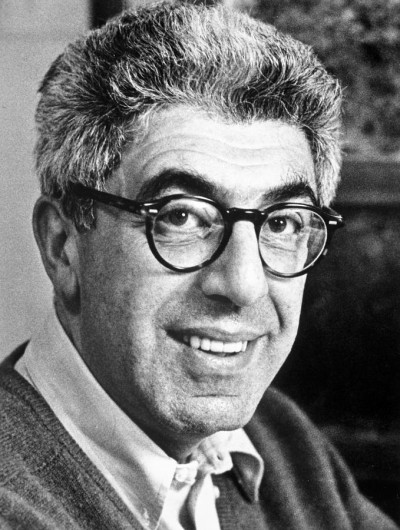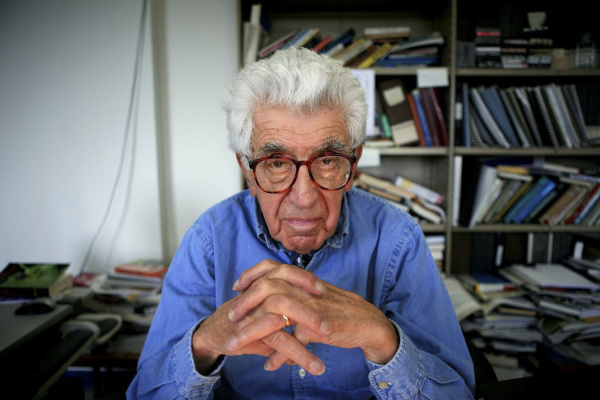Barry Commoner (Barry Commoner)

Commoner was born in Brooklyn, New York, on May 28, 1917, the son of Jewish immigrants from Russia. He received his bachelor’s degree in zoology from Columbia University in 1937 and his master’s and doctoral degrees from Harvard University in 1938 and 1941, respectively. After serving as a lieutenant in the United States Navy during World War II, Commoner moved to St. Louis, Missouri, where he became a professor of plant physiology at Washington University. He taught there for 34 years and during this period, in 1966, he founded the Center for the Biology of Natural Systems to study “the science of the total environment”.
In the late 1950s, Commoner became well known for his opposition to nuclear weapons testing, becoming part of the team which conducted the Baby Tooth Survey, demonstrating the presence of Strontium 90 in children’s teeth as a direct result of nuclear fallout. In 1958, he helped found the Greater St. Louis Committee on Nuclear Information. Shortly thereafter, he established Nuclear Information, a mimeographed newsletter published in his office, which later went on to become Environment magazine. Commoner went on to write several books about the negative ecological effects of atmospheric (i.e., above-ground) nuclear testing. In 1970 he received the International Humanist Award from the International Humanist and Ethical Union.
In his 1971 bestselling book The Closing Circle, Commoner suggested that the American economy should be restructured to conform to the unbending laws of ecology. For example, he argued that polluting products (like detergents or synthetic textiles) should be replaced with natural products (like soap or cotton and wool). This book was one of the first to bring the idea of sustainability to a mass audience. Commoner suggested a left-wing, eco-socialist response to the limits to growth thesis, postulating that capitalist technologies were chiefly responsible for environmental degradation, as opposed to population pressures. He had a long-running debate with Paul R. Ehrlich, author of The Population Bomb and his followers, arguing that they were too focused on overpopulation as the source of environmental problems, and that their proposed solutions were politically unacceptable because of the coercion that they implied, and because the cost would fall disproportionately on the poor. He believed that technological, and above all social development would lead to a natural decrease in both population growth and environmental damage.
Commoner examined the relationship between poverty and population growth, disagreeing with the way that relationship is often formulated. He argued that rapid population growth of the developing world is the result of standards that have not been met, observing that it is poverty that “initiates the rise in population” before leveling off, not the other way around. These developing countries were introduced to the standards, but were never able to fully adopt them, thus not allowing these countries to advance and limit their population growth.
Commoner continues to describe the reason why developing countries are still “forgotten” because of colonialism. These developed countries were, and economically still remain, “colonies of more developed countries”. Because Western Nations introduced things such as: roads, communications, engineering, and agricultural and medical services as a huge part of using and exploiting the developing nation’s labor force and natural resources, the first step towards a “demographic transition” was met, but other stages were not. This did not happen because the wealth that these developing countries created did not stay; it was “shipped out”, so to speak, and enabled the wealthier nations to achieve the different “levels of demographic transition”, while the colonies continued on without achieving the second stage, which is population balancing.
“Thus colonialism involves a kind of demographic parasitism: the second population balancing phase of the demographic transition in the advanced country is fed by suppression of that same phase in the colony”. “As the wealth of the exploited nations was diverted to the more powerful ones, their power, and with it their capacity to exploit increased. The gap between the wealth of nations grew, as the rich were fed by the poor”. Due to this exploitation of resources taken from developing nations, regardless of whether it was legal, it led to an unforeseen problem—rapid population growth. This could be seen by Nathan Keyfitz, a demographer, analysis that concluded “the growth of industrial capitalism in the Western nations during the period 1800–1950 resulted in the development of a one-billion excess in the world population, largely in the tropics”.
This is can also be seen in the study of India and contraceptives, in which family planning failed to reduce the birthrate because the people felt that “in order to advance their economic situation”, independent children were a necessity to gain better opportunities. The studies show that “population control in a country like India depends on the economically motivated desire to limit fertility”.
The solution presented in Commoner’s argument is that wealthier nations need to help the exploited or colonized countries develop and “achieve the level of welfare” that developed nations have. This is the only solution to gaining a balanced population in these developing countries. Commoner states that in order to remedy the world population crisis, that, in essence, is the outcome of abuse of poor nations by rich ones, can only done by “returning to the poor countries enough of the wealth taken from them to give their peoples both the reason and the resources voluntarily to limit their own fertility”. He feels that poverty is the main cause of the population crisis. If the reason behind overpopulation in poor nations is because of exploitation, then the only way to end it is to “redistribute [the wealth], among nations and within them”.
Commoner published another bestseller in 1976, The Poverty of Power. In that book, he addressed the “Three E’s” that were plaguing the United States in the 1970s: “First there was the threat to environmental survival; then there was the apparent shortage of energy; and now there is the unexpected decline of the economy.” He argued that the three issues were interconnected: the industries that used the most energy had the highest negative impact on the environment; the focus on non-renewable resources as sources of energy meant that those resources were growing scarce, thus pushing up the price of energy and hurting the economy. Towards the book’s end, Commoner suggested that the problem of the Three E’s is caused by the capitalistic system and can only be solved by replacing it with some sort of socialism.
In 1980, Commoner founded the Citizens Party to serve as a vehicle for his ecological message, and he ran for President of the United States in the 1980 U.S. Election. His official running mate was La Donna Harris, the Native-American wife of Fred Harris, a former Democratic Senator from Oklahoma, although she was replaced on the ballot in Ohio by Wretha Hanson. His candidacy for President on the Citizens Party ticket won 233,052 votes (0.27% of the total). After his unsuccessful bid, Commoner returned to New York City and moved the Center for the Biology of Natural Systems to Queens College. He stepped down from that post in 2000. At the time of his death, Commoner was a senior scientist at Queens College.
Commoner died on September 30, 2012, in Manhattan, New York. He was a member of the American Association for the Advancement of Science and has a star on the St. Louis Walk of Fame.
Born
- May, 28, 1917
- USA
- Brooklyn, New York
Died
- September, 30, 2012
- USA
- Manhattan, New York



